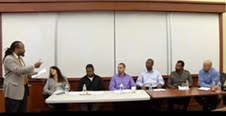CUNY presentation on access to higher education
CUNY researchers visit TC to discuss barriers to higher education and strategies to overcome them
By Elizabeth Dwoskin
Is affirmative action in higher education in decline? Are specific groups consistently overlooed in discussions of access to colleges and universities?
These and other questions were on the table when members of the TC and Columbia University community gathered in late February to hear researchers associated with the Howard Samuels Center at CUNY discuss barriers to higher education for some urban students, as well as the strategies for overcoming those barriers.
The CUNY researchers were speaking as part of the Teachers College Higher and Post-Secondary Education Program’s Lecture Series, which this year has featured the theme, “Expanding Access to Learning: Possibilities and Challenges for Higher Education in Urban, 21st-Century America.”
The lecture was co-sponsored by the Teachers College Vice President’s Office for Diversity and Community Affairs’ Diversity and Community Initiatives (DCI) Grant and the Gottesman Libraries. Doctoral candidates Leslie Williams and Milagros Castillo, recipients of the DCI grant, coordinated the event with TC faculty sponsor Anna Neumann, Professor of Higher Education.
“Faculty and students associated with CUNY’s Howard Samuels Center have been conducting important work investigating factors that aid or impede access to higher education,” said Neumann. “Their work is helping us to understand not only what ‘access to post-secondary institutions’ means, but more importantly, what ‘access to learning’ entails.”
The event opened with a broad review of the investigative work by Samuels Center Deputy Director Bill McKinney, which is known as the “Achieving Wider Access to Higher Education Project.” McKinney discussed lessons learned from historically inclusive institutions, the impact of rapidly increasing costs on higher education and the growth of for-profit higher education institutions.
The project, which will publish its findings later this year, also focused on the state of affirmative action including efforts at local, regional, and national levels to undermine affirmative action initiatives.
McKinney then moderated a panel of four current and former CUNY research associates and doctoral students who have contributed chapters to a forthcoming book on the project.
Michael Partis, a doctoral student in anthropology and a researcher for the Bronx African-American History Project, spoke about best practices in institutions sometimes described as “democracy’s colleges” -- specifically historically black colleges and universities, community colleges and tribal colleges – institutions that have traditionally served populations that face barriers to acquiring higher education.
Anthony Johnson, a doctoral student in anthropology, critiqued the significant public attention often given to small exemplary educational models such as the Harlem Children’s Zone and Stuyvesant High School. He argued that the number of needy students served by these institutions is relatively low, posing the question, “How has the exception become the rule?”
Ricardo Gabriel, a research associate and doctoral student in sociology, discussed three populations that face barriers to access: formerly incarcerated individuals, Appalachian residents and undocumented immigrants. He observed that these groups are often forgotten in discussions about traditional barriers to higher education, as well as in discussions about affirmative action.
Michael Sharpe, Assistant Professor of Behavioral Science at York College, CUNY, analyzed the American Civil Rights Institute, an organization led by African American businessman Ward Connerly that is committed to ending affirmative action programs in the United States. Sharpe discussed the decline of affirmative action, beginning with the U.S. Supreme Court’s 1978 Bakke decision and subsequent anti-affirmative action ballot initiatives and referenda in California, Washington, Michigan, Nebraska and Arizona.
The lecture’s final presenter, Veronica Momjian, a research associate and doctoral student in sociology, discussed successful strategies that various groups have used to oppose anti-affirmative action efforts in Colorado, Missouri and Oklahoma. Momjian tied together the various strands of the presentation and asserted that truly increasing access to higher education for all requires a concerted and comprehensive effort that goes beyond traditional approaches.
Published Friday, May. 13, 2011
